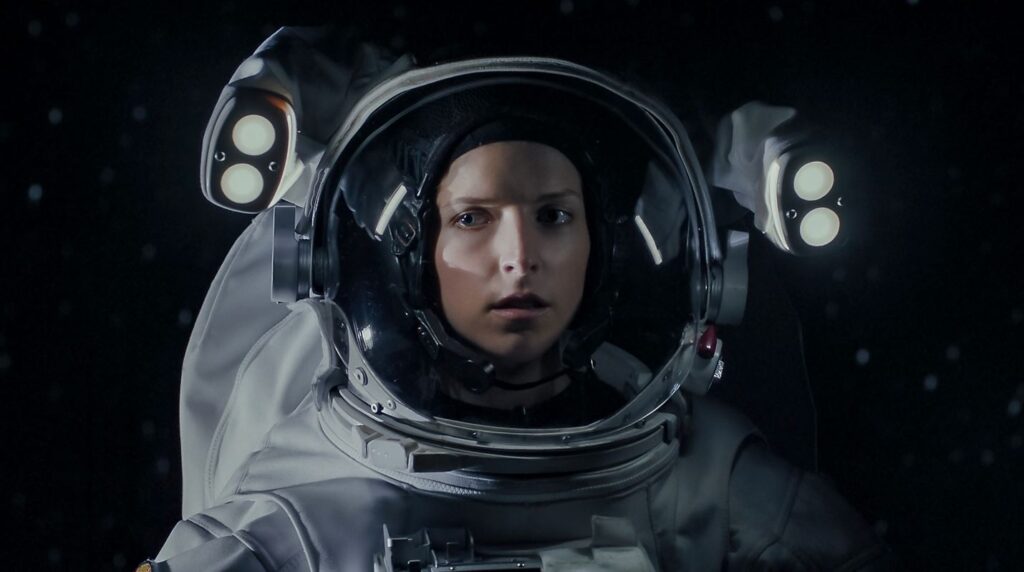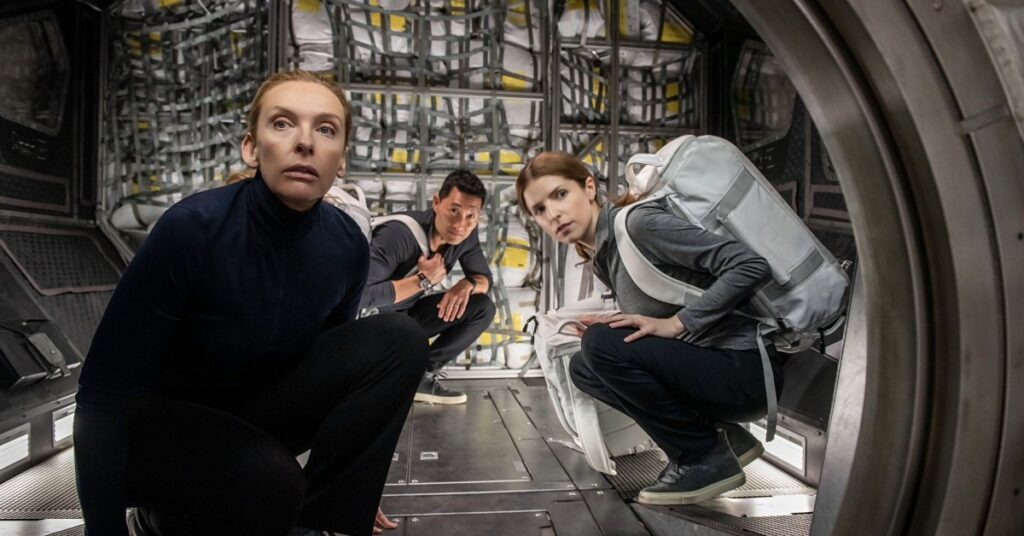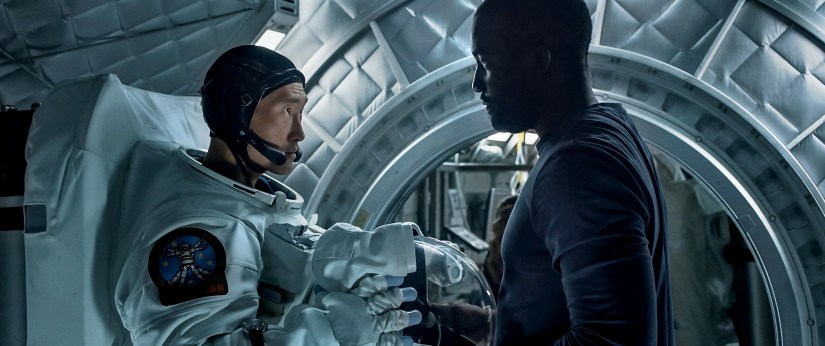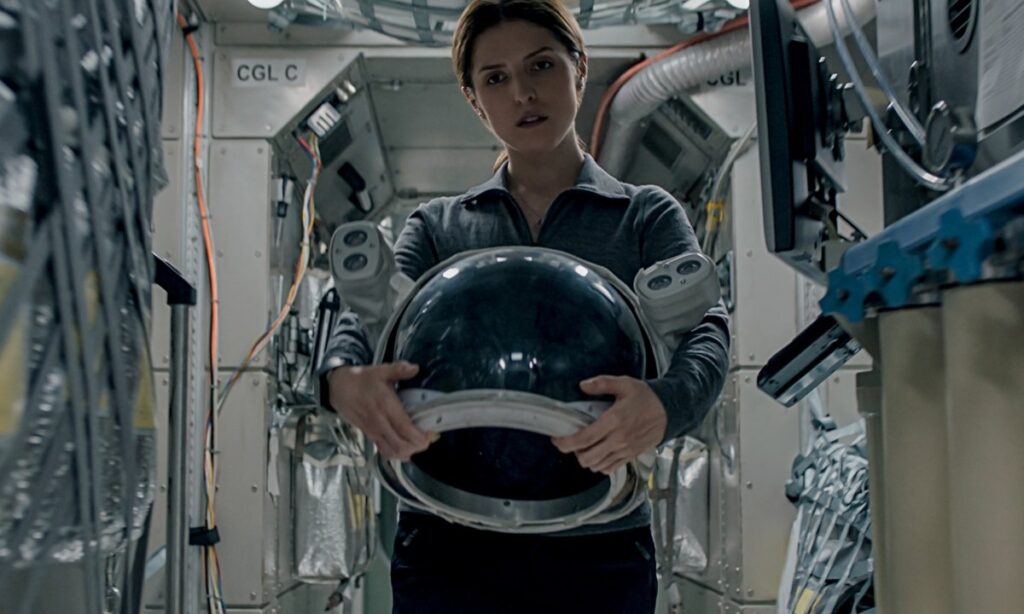
The minimalist space movie seems like a contradiction, but it’s actually an elegant solution to a familiar problem. The cosmos is so incomprehensibly vast, it’s impossible for cinema to convey its full breadth on screen; that’s doubly true for films released by Netflix, where said screen is attached to a television rather than a multiplex auditorium. And so Stowaway, the streaming giant’s new sci-fi feature, conceives of interstellar travel not as the launching pad for an epic adventure, but as the vehicle for a taut and constrained thriller. It’s a horror movie without a boogeyman; the inky enormity of outer space is plenty scary enough.
This particular vintage of stargazing picture has experienced a relative boom of late; recent examples include Geore Clooney’s The Midnight Sky, Claire Denis’ High Life, and Morten Tyldum’s unduly maligned Passengers. In terms of scale, Stowaway is smaller than all of those; it only features four characters, and its unnamed vessel is unremarkable, except maybe for being so cramped (the better to underline the setting’s claustrophobia). And while its final act includes its share of perilous derring-do in zero gravity, its main preoccupations are moral and philosophical rather than dynamic or kinetic.
The film’s general lack of movement is one challenge that its director, Joe Penna, rises to with aplomb, largely by relying on his gifted cast. Consider the tense opening sequence, which finds three astronauts—the commander, Barnett (Toni Collette); the doctor, Zoe (Anna Kendrick); and the biologist, David (Daniel Dae Kim)—strapped in and ready for a bumpy launch. In physical terms, not much actually happens beyond some camera judder, but between the anxiety on the actors’ faces and some smartly timed cuts to Barnett’s finger hovering over a button labeled “abort”, Penna effectively makes you forget that you’re really just watching people sitting on a soundstage.

And in its early scenes, Stowaway manages to smoothly define its characters without resorting to clumsy exposition. Barnett—whose electronic communications with Hyperion, a private alternative to NASA’s mission control, are one-sided, meaning we can’t hear what she’s hearing—is all business, but not so stern as to be unlikable. David and Kim exhibit a playful rivalry stemming from their respective alma maters being Harvard and Yale; their easygoing rapport involves debating the pronunciation of “applicable”. Everyone is both professional and personable, and everything about their mission—a two-year fact-finding trip to Mars—seems to be proceeding on schedule.
Then a dude suddenly falls out of the ceiling.
His name is Michael (Wynonna Earp’s Shamier Anderson), and if you’re shocked by his appearance, you must have missed the title. Regardless, Michael’s inexplicable emergence—apparently he’s an engineer who got inadvertently knocked out and locked inside a panel prior to launch, but honestly, don’t sweat the details—causes understandable consternation among our traveling trio. Who is he? Where did he come from? What is he going to do? And why does Barnett keep worrying about this bulky device that carries the ominous acronym of CDRA?
The biggest surprise of Stowaway—and this is arguably both a spoiler and its opposite—is that it doesn’t feature any big surprises. Michael isn’t a Russian spy. Barnett isn’t executing a covert mission that she’s keeping secret from her subordinates. Hyperion isn’t an evil corporation with a nefarious and mercenary agenda. There are no lurking villains or hidden monsters. The movie is exactly what it purports to be.

And that, ultimately, is a series of ethical quandaries. The most precious resource on this troubled journey to the red planet proves not to be food or water but oxygen; Michael’s unanticipated presence, combined with some unfortunate mechanical failures, has dwindled the ship’s supply of breathable air. The result, without getting too specific, is a game of interstellar musical chairs with life-or-death stakes.
Despite its polished production design and overall technical competence, Stowaway’s story can feel vaguely theoretical, as though the screenplay (which Penna wrote with Ryan Morrison) is bombarding the characters with Complex Problems lifted from a philosophy textbook. (Cue Community fans shrieking, “Crisis alert!”) These dilemmas—the weighing of human life; the conflict between collective prosperity and individual autonomy—aren’t uninteresting, but their presentation nonetheless feels canned and engineered. (For a superior example of this approach, see Danny Boyle’s Sunshine.)
Thankfully, the actors help add dimension to their archetypal roles, though the script does the men few favors; Michael is saddled with an unnecessary backstory involving a burn scar and a disabled sister, while David is forced to deliver multiple monologues about the scientific importance of his beloved research. (A scene where the two of them discuss jazz inevitably recalls La La Land, and that’s all I’m saying on the subject.) Still, Anderson and Kim both bring forth their characters’ essential decency, while Collette lends her commander a quiet but unshakable authority. The highlight, though, is Kendrick, whose Zoe is spunky and sprightly but also intuitive, intelligent, and compassionate—qualities that the actor mixes seamlessly.

In its final act, this intently thoughtful and somewhat thought-provoking film attempts to rev up its engine, with a handful of life-threatening sequences that shift the action from verbal to physical. Penna, whose first feature was the sturdily efficient Arctic (starring Mads Mikkelsen as a marooned pilot), is plainly interested in stories of survival, and in how deadly situations require body and mind to work in concert. He’s good at this stuff but maybe not good enough; the set pieces of Stowaway involve a lot of climbing and sliding, yet the choreography isn’t especially dramatic or distinctive. It’s unfair to compare a picture of this scope and budget to Gravity—which remains this century’s preeminent fusion of delicate character moments and eye-popping spectacle—but it’s also hard not to wish that the movie’s ostensibly terrifying scenes were a bit more exciting.
Still, Stowaway flashes sufficient life and detail to make it consistently engaging, even if it’s never breathtaking. There are lots of clever touches, like how it inverts traditional gender dynamics—Zoe is the graceful athlete, while David is the one who vomits during the turbulent launch—or how it conveys critical information simply by changing a color scheme from green to yellow. Its predictability doesn’t deprive it of its momentum, and although it favors warm sentimentality over cold realism, Kendrick’s lively and sympathetic performance lends it some emotional weight. COVID concerns aside, it’s a shame that this movie is on Netflix, as opposed to receiving a wide release. It’s exactly the kind of low-key, pleasurable diversion where you could find joy by sneaking into the theater, without feeling guilty for not having paid for a ticket.
Grade: B-
Jeremy Beck is the editor-in-chief of MovieManifesto. He watches more movies and television than he probably should.
